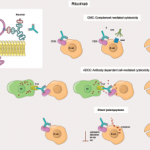NEW YORK (Reuters Health)—A significant proportion of children with rheumatic diseases develop new-onset hypogammaglobulinemia and infections following treatment with the monoclonal antibody rituximab, according to new U.S. research.
“Increased risk appeared to be mediated, at least in part, by exposure to pulse dose corticosteroids,” write Marc Natter, MD, of Harvard Medical School and Boston Children’s Hospital and colleagues in Rheumatology. “Larger, prospective studies are needed to gain a more complete understanding of the longitudinal risks and best practices for monitoring the effects of rituximab therapy and to identify risk factors in different disease populations.”1
In an email to Reuters Health, Dr. Natter notes, “Rituximab is usually a safe and well-tolerated therapy when prescribed and managed by healthcare providers who are experienced in its administration and management of potential adverse effects.”
“[Because] patients who are sicker are almost certainly more likely to develop complications including infections,” he says, “our findings do not predict risk, but do raise a potentially important association that we believe deserves more detailed study as it may be able to predict overall as well as individual risks.”
The researchers looked back at the records for 85 children who were treated at the Boston Children’s hospital from 2009 to 2019. The patients were between 6 and 24 months of age and had received rituximab for childhood-onset rheumatic disease.
Twenty-seven percent developed new-onset hypogammaglobulinemia within an 18-month period of rituximab induction, and 26% developed one or more infectious complications. Half of these infections were considered serious and required further inpatient management.
In an analysis adjusted for possible confounders, pulse corticosteroid therapy exposure in the month before rituximab infusion was significantly associated with new-onset hypogammaglobulinemia (odds ratio [OR]: 3.94; 95% confidence interval [CI], 1.07 to 16.0) and infectious complications (OR: 15.3; 95% CI, 3.04 to 126.8).
Dr. Natter notes the “use of pulse-dose steroids is a highly effective therapy for these conditions” and indicated he and his colleagues “were not able to incorporate the severity of disease or disease activity over time” into their analyses.
Significant predictors of serious infectious complications included hypogammaglobulinemia that developed after rituximab infusion (OR: 7.89; 95% CI, 1.41 to 65.6).
Patients with vasculitis had a higher likelihood of infectious complications and serious infections 18 months after rituximab use compared with patients with other rheumatic diseases.
Future research will be needed to confirm and better understand the clinical implications of these findings, the researchers say.
“It will be especially important to study and better understand how disease activity, the full range of concomitant immunosuppressive and anti-infective medications, and other potential confounders contribute to development of hypogammaglobulinemia and infections in a larger, multi-center cohort,” says Dr. Natter. “This may yield insights that will enable us to identify individuals at higher risk of infections who may benefit from closer observation and prophylactic therapies.”


